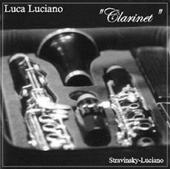CLICK here to listen/download MP3s and to find out more about the album
English version
We are pleased to present "Clarinetâ€, the latest album by Luca Luciano “classically trained Italian virtuoso resident in London†(“Jazz UKâ€). Luca is a noted clarinettist, arranger and composer who now makes his home in London, having developed an enviable reputation as an instrumental virtuoso around the UK and overseas via reconrdings and concert hall appearences ("Masterful Clarinet" for Musician Magazine). This latest project keeps faith to his uncompromised and sometimes controversial approach to music and the will to experiment. The main “theme†of this project is the composer Igor Stravinsky and in particular “The Rite of Spring†which has inspired Luciano so much. As a homage to the great Russian composer, some small quotations are present from his music (including “the Firebirdâ€) and also Mahler’s (second symphony), Berio’s Sequenza and Ravel’s in the two Sequenze, in Divertimento 7, Divertimento 10 and “Naimaâ€. Luciano’s sound has been built on a vintage “Bb†Buffet clarinet which bears more keys and rings (20 keys and 7 rings) than the “regular†French clarinet (generally 17-18 keys and 6 rings) and goes a semitone lower as well. The instrument, then, is slightly longer than an “A†clarinet which explains its darker tone, versatility and more hybrid tone, almost like a Basset Clarinet, that fits so much Luca’s style. Yet the extra keys and extension give him the chance to create sound effects otherwise almost impossible to generate (e.g. Divertimento 4 and Divertimento 9). The two Sequenze for Clarinet Solo are the core of the album and have been inspired by the famous line of Gustav Mahler “A symphony must be like the world, it must embrace everythingâ€. Luciano tries in this remarkable, pure improvisational journey to embrace all styles of music he loves in an imaginative tour around the world from classical European music to Afro-American or folkloristic music of the South of Italy, from contemporary classical music with chormaticism and angular-shaped melodies to lyric and almost operatic atmospheres, from blues to bop. In fact Luciano firmly believes in the great potentiality of the clarinet and its expressivity and tries to stretch it to the limit including modulating the tone when necessary (as in the two Sequenze) to make it sound like a "Chalumeau" on the “tarantella†parts or more like an American clarinetist of the 30s and 40s. The album also includes the famous “Three Pieces for Clarinet Soloâ€, an arrangement of a famous jazz tune “Naima†and five “Divertimenti†in particular the number 7 on a theme from “Lt. Kije’†by Prokofiev developed into a “canone†before the long improvised cadenza around the “Neapolitan†minor scale of “G†by the soloist and the finale. The two Sequenze and Divertimento 7, 8 and 10 also shows Luca’s interest in free improvisation and chromaticism strongly influenced by the saxophonist and educator Dave Liebman. The album, MCPS Licensed, has been produced by Luca Luciano and Gianni Varone who is also responsible for the distribution and selling of the Digidesign equipments in Italy.
Italian Version
E’ con grande piacere che presentiamo “Clarinetâ€, il nuovo album del clarinettista/compositore e Professore di Conservatorio Luca Luciano “virtuoso italiano di estrazione classica residente a Londra (“JazzUKâ€)â€. Luciano e’ estremamente apprezzato in Gran Bretagna ed all’estero per il suo stile inconfondibile e la qualita’ delle sue composizioni ("Masterful Clarinet" a seconda di Musician Magazine) e quest’ultimo progetto mantiene fede alla sua voglia di proporre musica seza compromessi e la volonta’ di continuare a sperimentare. Il tema principale di questo progetto e’ il compositore Igor Stravinsky ed in particolare “La Sagra della Primavera†che ha tanto inspirato Luciano. Come omaggio verso il compositore russo e la sua composizione, diverse piccole citazioni da Stravinsky (anche “L’uccello di fuocoâ€), Mahler (seconda sinfonia) e Ravel sono presenti nelle due Sequenze, Divertimento 7, Divertimento 10 e Naima. La sonorita’ di Luciano e’ costriuta su un Clarinetto in Sib Buffet che monta piu’ chiavi ed anelli (20 chivi e 7 anelli) di un normale clarinetto francese (generalmente con 17 chivi e 6 anelli) e che raggiunge un semitono piu’ basso. Questo strumento, quindi, e’ leggermente piu’ lungo di un clarinetto in La, il che’ spiega la sonorita’ piu’ scura, versatilita’ e sonorita’ piu’ ibrida, quasi da clarinetto di bassetto, che si conbina perfettamente con lo stile di Luciano. Inoltre le chiavi aggiuntive e la maggiore estenzione danno la possibilita’ di generare effetti sonori altrimenti impossibili da creare (es. Divertimento 4 e Divertimento 9). Le due Sequenze per Clarinetto Solo sono il cuore di questo album e sono state inspirate dalla famosa frase di Gustav Mahler “Una sinfonia deve essere come il mondo, deve contenere tuttoâ€. Luciano, quindi, prova ad abbracciare tutti gli stili musicali che lo appassionano in un viaggio improvvisativo ed immaginario attraverso il mondo dalla musica classica europea a quella americana o folkloristica del sud Italia, dalla musica classica contemporanea con cromatismi e melodie angolari a fraseggi piu’ lirici, dal blues al bop. In fatti Luciano crede fermamente nelle grosse potenzialita’ del clarinetto e nella sua espressivita’ e prova a spingerlo agli estremi sino a cambiare il suono se necessario (come nelle due Sequenze) e farlo suonare come un Chalumeau sulle parti a “tarantella†o come un clarinettista americano degli anni 30 o 40. L’album, inoltre, include i “Tre Pezzi per Clarinetto Soloâ€, un arrangiamento di un famoso tema jazz (“Naimaâ€) e cinque Divertimenti in particolare il numero 7 da un famoso tema di Prokofiev (“Tenente Kije’â€) sviluppato in un canone, una lunga cadenza improvvisata attorno alla scala minore Napoletana di Sol da parte del solista prima del finale. Le due Sequenze e Divertimento 7, 8 e 10 mostrano l’interesse di Luciano verso l’improvvisazione libera e la musica cromatica fortemente influenzato dal saxofonista e didatta Dave Liedman. L’album, registrato e patentato con la MCPS britannica, e’ stato prodotto da Luca Luciano e Gianni Varone di Start Up Audio responsabile per la distribuzione e vendita di macchinari e software della Digidesign in Italia.
